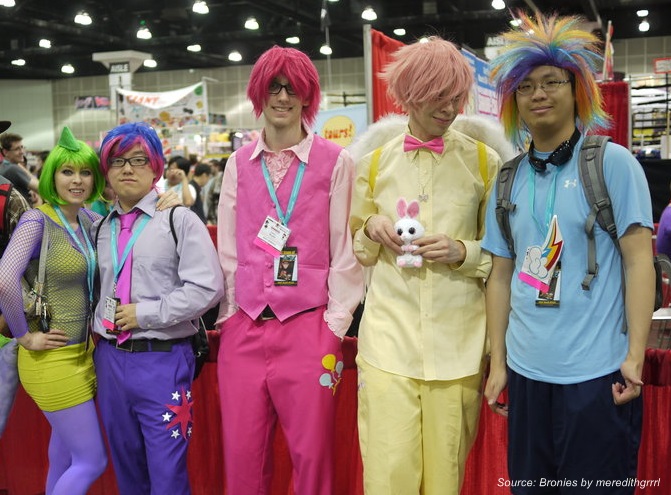Living Among Us
There are thousands of them. Teachers, scholars, blue and white collar workers, and entire community of men who love anime ponies. “My Little Pony,” to be precise.
This isn’t some kind of, “Oh, snap, my sister had these in junior high, so I hung on to them for a bit.” We’re talking true adoration.
The issue at hand can be attributed to this showpiece. Flowing hair and bright eyes cause one to overlook her generous feet. This is the kind of pony, so many have come to worship.
There’s a robust marketplace for this fandom, as well.
How It All Happened
 Let’s take a step back to see what happened. The original ‘My Pretty Pony’ toy was introduced in 1981. That was the one where you could comb her hair and tie a ribbon to show you cared.
Let’s take a step back to see what happened. The original ‘My Pretty Pony’ toy was introduced in 1981. That was the one where you could comb her hair and tie a ribbon to show you cared.
Apparently, not enough people showed they cared, because two years later the ‘My Little Pony’ line was launched to replace it. Although they were not called My Little Ponies, the My Pretty Ponies were, in a way, the very first My Little Pony toys.
These equestrian wedges of plastic became popular during the 1980s. The original toy line ran from 1983 to 1995 (1992 in the US), and inspired animated specials, an animated feature-length film, and four animated television series.
And people who followed it as an essential part of their lives, became known as “Bronies,” a combination of “bro” and “pony.” Urban Dictionary defines the phenomena as, “A name typically given to the male viewers/fans (whether they are straight, gay, bisexual, etc.) of the My Little Pony show or franchise. They typically do not give in to the hype that males aren’t allowed to enjoy things that may be intended for females.”
These folks are serious. They even produce an annual convention: BronyCon. This year’s is in Baltimore.
Defending My Little Pony
Bronies defend their moniker. “So what if I am a brony?,” explains Battlemuffins, in a journal entry on Deviant Art. “There’s nothing wrong with it…we’re proud people who have done nothing wrong,”
Like other bronies, Battlemuffins is often subject to ridicule. He recounts his first bullying, “The breath left my body as the fist drove hard into my stomach. My eyes crossed as I took a blow to the face.” He recollects, “Keep out of our way girly boy,” one bully sneers at him just before being kicked in the ribs.
Brony Michael Johns gave a presentation about the television series My Little Pony: Friendship Is Magic, for his college final. After he finished his report, he went out into the hallway when two other students beat him up. Tragically, Michael’s hand was torn off during the scuffle.
This type of harassment is commonplace for those in the brony community. So much, in fact, the Internet is host to countless stories and memes about the problem.
Challenging Gender Norms
Samuel Miller, a doctoral student at the University of North Dakota continues to study the brony community throughout his studies. In a recorded, 2014 lecture at BronyCon he opined upon Bronies: An Analysis of Fandom and Gender. He reveals a multitude of implications that Bronies bring to fandoms, media, and gender.
First off, you’re not necessarily gay if you like My Little Pony. The men who stand among this crowd have effectively declared, “It’s okay for me to like what I like and not label it by gender or sexuality.”
 Miller references the 1990 book, Epistemology of the Closet by Eve Kosofsky Sedgwick. Having been called “the greatest influence on geographical research on sexualities,” her work asserts that while not everyone is bisexual in physical behavior, everyone is to some degree bisexual in their inherent qualities of mind and character. .
Miller references the 1990 book, Epistemology of the Closet by Eve Kosofsky Sedgwick. Having been called “the greatest influence on geographical research on sexualities,” her work asserts that while not everyone is bisexual in physical behavior, everyone is to some degree bisexual in their inherent qualities of mind and character. .
This isn’t some social, theoretical assertion, either. Indeed, a lot of what happens in the brony community mirrors the homosexual community. Yet, bronies are predominantly straight.
Right there is where the social disruption occurs. What bronies are doing challenges to social norms about what defines being a young man or a young woman.
Suppose you were and aficionado of The Smurfs. Do you proudly profess your adoration for Smurfette? So much that it becomes a rewarding part of your life?
At least ponies are real. Smurfs are not.
Miller asserts in his monologue, “I got the fun job. Whereas my cohorts deal with series stuff like crisis communication and performance art…I got all the ponies.”
And that’s where the argument ends and curiosity begins. While I may never become a brony, I’m envious of the camaraderie that goes along with it.






2 Comments
Comments are closed.